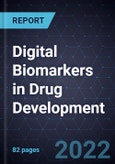Transformational Growth for Clinical Trials via Enhancements to Patient Recruitment, Stratification, Monitoring, and Drug Response Comprehension
Pharmaceutical companies spend billions of dollars in drug development because of expensive and time-consuming clinical trials, with a meager success rate. Frequent clinical visits, manual data processing, and a lack of consistent data on the effectiveness of the investigation of medical products contribute to their low success rate.
Digital biomarkers derived from wearable sensors and advanced algorithms offer an opportunity to analyze the response of investigational medical products in clinical trials continuously and remotely. Digital biomarkers eliminate the need for frequent clinic visits to monitor the patient's health status.
The halting of clinical trials because of the COVID-19 pandemic has fueled digital biomarker adoption for remote patient monitoring in clinical practices and clinical trials. Remote patient monitoring is imperative for pharmaceutical companies to conduct efficient clinical trials, save costs, and decide on proceeding with or discontinuing an investigational drug. Efforts are underway by market participants to transform digital biomarkers into digital measurements or endpoints in clinical trials. Digital biomarkers are instrumental in assessing the efficacy and safety of the therapy in DCTs and timely patient recruitment.
Digital biomarkers offer an opportunity for pharmaceutical companies to advance research in complex diseases, such as AD and PD, and to find novel biomarkers that demonstrate the effectiveness of an investigational drug on a patient’s disease condition in clinical trials. The study focuses on 3 major therapy areas, neurology, oncology, and cardiology, which digital biomarkers impact.








